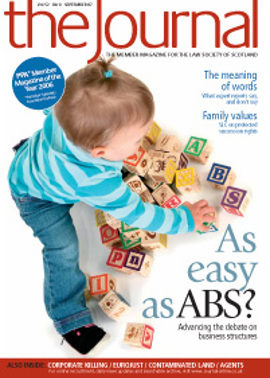Invoking the UCCJEA

It is usually considered that the only safe course, when making Scottish orders for residence and contact in the expectation or hope that they will be honoured in the United States, is to obtain a “mirror image” order in the state concerned. Even that has not been considered safe, as the party having the child might move from state to state. Such a move might be for perfectly good reasons, but might also be a deliberate attempt to avoid enforcement of orders.
Not many agents are aware of the existence of the Uniform Child Custody Jurisdiction and Enforcement Act 1996 (the UCCJEA, as it is known).
A pressing need
Prior to the promulgation of this Act in 1996, enforcement and recognition of orders made in regard to children was chaotic in the United States. Each state had its own laws and there was no federal unification. A situation could easily arise whereby actions were taking place at the same time in several states, all of whom claimed jurisdiction, and contradictory orders could be made. Although there had been a previous enactment, the Uniform Child Custody Jurisdiction Act 1968, and it had been adopted by all 50 states, its terms had not been adopted unaltered by many of the states, and accordingly confusion continued to reign.
Furthermore a federal statute, the Parental Kidnaping [sic] Prevention Act 1980, laid down somewhat different jurisdictional rules, causing interpretation of the two Acts to be “technical enough to delight a medieval property lawyer” (Homer H Clark, Domestic Relations (2nd ed, 1988), §12.5 at 494).
As a result of this the National Conference of Commissioners on Uniform State Laws in the early 90s decided that a new Act should be prepared, which resulted in the UCCJEA in 1996.
Parallels with the UK
This is not a federal Act. Each state has to adopt its suggested wording, and may make changes in doing so. As at August 2006 only Indiana, Missouri, Massachusetts, South Carolina, Vermont and Puerto Rico had not adopted the Act.
In essence, it creates a situation not unlike that which prevails between England and Scotland. It gives primary jurisdiction to the “home state”, provides for registration in another state for enforcement, and requires the second state to enforce it as if it were an order made in the second state.
Its primary interest for Scottish lawyers, however, is s 105 which states:
“(a) A court of this State shall treat a foreign State as if it were a State of the United States for the purpose of applying [Articles] 1 and 2.
“(b) Except as otherwise provided in subsection (c), a child-custody determination made in a foreign country under factual circumstances in substantial conformity with the jurisdictional standards of this [Act] must be recognized and enforced under [Article] 3.
“(c) A court of this State need not apply this [Act] if the child custody law of a foreign country violates fundamental principles of human rights.”
The Articles are roughly equivalent of what would be termed Parts in our legislation. Article 1 deals with “General Provisions” including interpretation, procedure, communication between courts etc, and includes s 105. Article 2 concerns Jurisdiction, and Article 3 Enforcement.
Local advice
It is important in reading the Act to recognise that the words “Act” and “Article” are in brackets for a good reason. This is only a draft Act that it is recommended that the states adopt. When dealing with any state it is therefore essential to take advice from a local lawyer as to the extent to which the Act has been adopted and to what extent it is enforced in relation to foreign orders, let alone whether it has been adopted. Advice should also be taken as to what is necessary to ensure that any Scottish order is made “under factual circumstances in substantial conformity with the jurisdictional standards of this Act”.
Karen Bruce Lockhart, Advocate
In this issue
- TUPE: stay your hand
- Nothing new under the sun
- ABS - Actual Benefit Soon?
- A chance to succeed?
- Killing in company
- Longer arm of the law
- Agents... a commercial view
- Bad language
- Remote gambling - all bets off?
- What makes a team?
- Managing the fraud risk
- Duties to the court
- Copycats: another nine lives?
- Activity in the courts
- Invoking the UCCJEA
- The men in black
- Scottish Solicitors' Discipline Tribunal
- Website reviews
- Book reviews
- Big names, big issues for annual conference
- Meet the Committee: Cameron Ritchie
- Contaminated land - where are we now?






